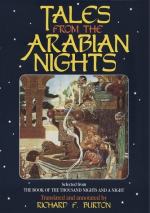[FN#274] I quote Torrens (p. 400) as these lines have occurred in Night xxxviii.
[FN#275] Moslems have only two names for week days, Friday, Al-Jum’ah or meeting-day, and Al-Sabt, Sabbath day, that is Saturday. The others are known by numbers after Quaker fashion with us, the usage of Portugal and Scandinavia.
[FN#276] Our last night.
[FN#277] Arab. “Tayf"=phantom, the nearest approach to our “ghost,” that queer remnant of Fetishism imbedded in Christianity; the phantasma, the shade (not the soul) of tile dead. Hence the accurate Niebuhr declares, “apparitions (i.e., of the departed) are unknown in Arabia.” Haunted houses are there tenanted by Ghuls, Jinns and a host of supernatural creatures; but not by ghosts proper; and a man may live years in Arabia before he ever hears of the “Tayf.” With the Hindus it is otherwise (Pilgrimage iii. 144). Yet the ghost, the embodied fear of the dead and of death is common, in a greater or less degree, to all peoples; and, as modern Spiritualism proves, that ghost is not yet laid.
[FN#278] Mr. Payne (iii. 133) omits the lines which are apropos de rein and read much like “nonsense verses.” I retain them simply because they are in the text.
[FN#279] The first two couplets are the quatrain (or octave) in Night xxxv.
[FN#280] Arab. “Ar’ar,” the Heb. “Aroer,” which Luther and the A. V. translate “heath.” The modern Aramaic name is “Lizzab” (Unexplored Syria. i. 68).
[FN#281] In the old version and the Bresl. Edit. (iii. 220) the Princess beats the “Kahramanah,” but does not kill her.
[FN#282] ’This is still the popular Eastern treatment of the insane.
[FN#283] Pers. “Marz-ban” = Warden of the Marches, Margrave. The foster-brother in the East is held dear as, and often dearer than, kith and kin.




